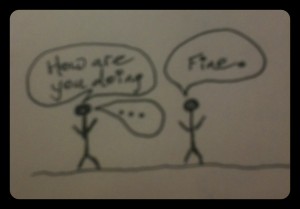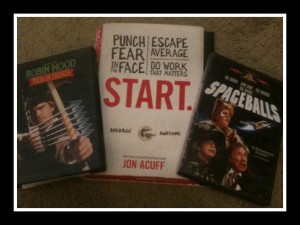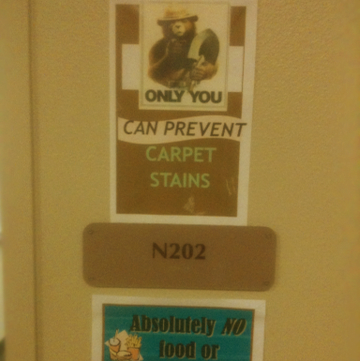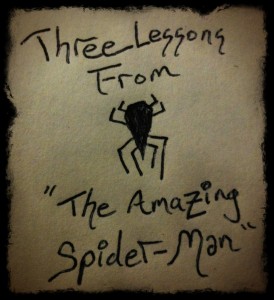Author: Christopher Battles
Testing Pressgram
An Answer to “How are you doing?”
Assuming you only leave the house to grab the mail, you probably get the question “How are you doing?” at least once a day. (I started with an assumption and I am not sorry.) What is the most common answer you hear to this question? I hear “good” and “fine.” Do we want to be better than “fine” and “good?”

Camera + and me
A coworker at my first job would get “fine” as an answer and gently remind them they were doing better than “fine.” I do not remember specifically what he would say, but it was along the lines of, “Just fine, not good, not great?” He would then saw how they walked into into the store and able to do different things.
A while ago I heard the the answer, “Good and getting better” and have used it as my default answer. It is the best answer I have heard and it fits comfortably with me. The “and getting better” part that I truly enjoy, because the “getting better” shows growth. It is a reminder to me to that I am growing and the answer catches peoples attention even in the quickest interactions. I flipped through one of Zig Ziglar’s book See You at the Top and found a happy caricature proclaiming, “I’m super-good, but I’ll get better.” I should jump ship to the S.S. “Super-Good,” but I have not fully adopted the message of his book. I agree with everything in it, but as I have mentioned before, “Momentum is created by starting.” I do not feel I have started enough… Personally, I want to have more momentum before I be aboard the S.S. Super Good. I do want to be on that ship though. So what will be after the S.S. Super Good?
Getting ready to put the final touches on this post and hitting publish, I realized I never mentioned why I find this important. As Zig Ziglar said in See You at the Top, “…whatever we put into our mind is going to come out of it.” If “fine” and “alright” is what declare to strangers and family and friends throughout the day, how will we improve to “good.” A few pages later Ziglar says, “Assume a trait or characteristic, and later you will possess it. You will grab it-then it will grab you.” You are not be a ________, but go ahead and try it.
I used to not be a reader, but after hearing the importance of it and realizing I wanted to be a reader and now read at least a book a month. I will admit, sitting down and reading is not the same to me as sitting down and watching a movie, but I realized how much I can learn and enjoy reading on many different levels.
What is your default answer to the question, “How are you doing?”
Lessons from a book and an interview I did not have with Mel Brooks
Once upon time I read this article with Mel Brooks (MB) by the A.V. Club. Here is the part that I gravitated toward.

Camera +
The answer “doing what I wanted” sounds great, and it is great. What may be hard is finding what I want to do. The options seem so open (yet closed when fear is not punched in the face).
“I have always wanted to be ________________” is not something I have a clear answer for. Although this post was started before reading Start: Punch Fear in the Face, Escape Average and Do Work that Matter, ideas in my skull (#ThoughtInMySkull) have realized that it all boils done to I am doing. I will never be ________________ unless I start. Momentum is created by starting.
Example: I can talk about (complain) how I need and want to do work that matters, but until I start doing something about it I am a resounding gong.
http://www.youtube.com/watch?v=4Xb-hMKl3Rs-A&w=320&h=240
What is something you will start?
Answer: It could be reading Start 😉
“I’m a mawg: half man, half dog. I’m my own best friend!” – Barf (Spaceballs)
Three Lessons From “The Amazing Spider-Man”
I enjoy the lessons which are found in movies. Often they are intentional, but sometimes it just has to do with our mindset. Three lessons I learned from The Amazing Spider-Man are:
- He heard/felt a calling
While standing on a roof top he is called to go one way and also hears sirens going off in the distance and feels that he must use his spider abilities to assist. He felt an inward calling to use what he has to help others.
- Not all walls are structural
In a fight seen in a high school people are getting thrown around and someone goes through a trophy case and through the wall it is front off. Behind those trophies was a wall which had not structural support to the building. Many of the walls built in life (by us or others) can be broken down with only a little repair needed. Let us freely break down some walls in our life.
- Go out to help others
Spider-Man helps someone and later is helped by a family member of that person, when the web slinger is hurt. Spider-Man has been declared as a bad guy by the city officials, but this family member saw that this man was out to good. He saw his conduct and helped him when he needed it. There will be times when we need someone else to help us. Let us go out of our way to help others. Let us follow the golden rule. (The Master Key Is Golden)
K, bye
What is a lesson that you learned from this movie?
A good book which incorporates lessons from movies is John Eldredge’s “Wild at Heart.”



